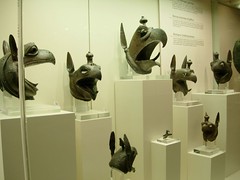Tales of griffins were eagerly reported by Herodotus and in Pliny's Natural History, says wikipedia.org. The griffin was said to build a nest, like an eagle. Instead of eggs, it laid agates. The animal was supposed to watch over gold mines and hidden treasures, and to be the enemy of the horse. The incredibly rare offspring of griffin and horse would be called a hippogriff. Griffin was consecrated to the Sun; ancient painters presented the chariot of the Sun as drawn by griffins. The griffin was a common feature of "animal style" Scythian gold; it was said to inhabit the Scythia steppes that reached from the modern Ukraine to central Asia; there gold and precious stones were abundant; and when strangers approached to gather the stones, the creatures would leap on them and tear them to pieces.
But I come not to discuss such wild things, but the ancient games of Olympia.
Large crowds gathered for religious festivals in ancient Greece, says WorldBook.com. At these festivals, athletes competed in such events as wrestling, boxing, foot and chariot races, jumping, and javelin throwing. Religious festivals also included feasts, colorful processions, and performances of plays. Several religious festivals brought together people from throughout the Greek world. The Olympic Games, the most famous of these festivals, were held every four years in honor of Zeus. Even wars halted during the Olympics. Victory in the games was the highest honor an athlete could achieve.
WorldBook on a comparison between Athens and Sparta:
Athens became the most successful democracy of ancient Greece during the 400's B.C. Every male Athenian citizen had the right to serve permanently in an assembly, which passed laws and determined government policies. The assembly also elected Athenian generals. Each year, the citizens drew lots to select a council of 500 men. This council ran the day-to-day business of government and prepared the bills that the assembly debated and voted on. Jurors were also chosen by lot.
Some wealthy Athenians disliked their system of government. They felt that the poor dominated the government and took advantage of the rich. Most Athenians, however, cherished their democracy.
Sparta was the most powerful oligarchy in ancient Greece. Citizens made up only about 10 percent of the population. Most people were serfs who farmed the land. Two kings, who inherited their thrones, headed the army. Sparta was governed by 5 officials, called ephors, and the gerousia, a council made up of 28 elders and the kings. Citizens elected ephors to one-year terms and members of the gerousia to life terms. Sparta had a citizen assembly. But citizens could not propose issues for debate in the assembly.
Subscribe to:
Post Comments (Atom)


No comments:
Post a Comment